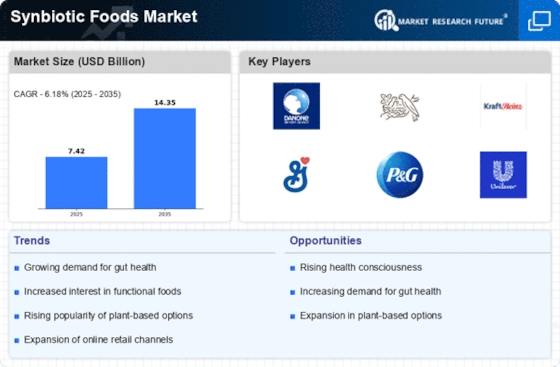Top Industry Leaders in the Synbiotic Foods Market

The Synbiotic Foods market has witnessed substantial growth as consumers increasingly recognize the health benefits associated with combining prebiotics and probiotics in their diet. As of 2023, key players in this market are strategically positioning themselves to capitalize on the rising demand for synbiotic foods, deploying various strategies to maintain or enhance their market share.
Key Players:
Yakult Honsha Co.
Ltd. (Japan)
H&H Group (Hong Kong)
The Kellogg Company (US)
Danone S.A. (France)
General Mills
Inc. (US)
Pfizer Inc. (US)
Daflorn Ltd. (Bulgaria)
Chobani Global Holdings
LLC (US)
Probiotical S.p.A. (Italy)
Chr. Hansen Holding A/S (Denmark)
Diamond V (US)
Sabinsa Corporation (US)
Behn Meyer Deutschland Holding AG & Co. KG (Germany)
Ajinomoto Co.
Inc (Japan)
and Asahi Group Holdings
Ltd (Japan)
Strategies Adopted:
Key players in the Synbiotic Foods market employ diverse strategies to remain competitive. Continuous product innovation, with a focus on developing new synbiotic formulations and incorporating them into existing product lines, is a central strategy. These companies invest in research and development to stay ahead of emerging health trends, producing synbiotic foods that cater to the evolving needs of health-conscious consumers. Strategic partnerships with health professionals, nutritionists, and researchers contribute to enhancing the credibility and efficacy of their synbiotic products. Additionally, marketing efforts to educate consumers on the benefits of synbiotics, including digestive health and immune system support, play a vital role in expanding market reach.
Market Share Analysis:
Market share analysis in the Synbiotic Foods market is influenced by several factors, including brand recognition, product quality, pricing strategies, and distribution efficiency. Companies with well-established brands and a reputation for producing high-quality synbiotic foods tend to secure a larger market share. Pricing strategies that balance affordability with the perceived health benefits of synbiotics play a crucial role, given the competition with other functional foods and dietary supplements. Efficient distribution networks, covering both traditional retail channels and online platforms, are essential for maintaining a competitive edge in delivering synbiotic products to a broad and diverse consumer base.
New and Emerging Companies:
While key players dominate the Synbiotic Foods market, new and emerging companies are entering the sector, often focusing on specific applications or unique formulations. These entrants may emphasize specialized synbiotic blends targeting specific health concerns, such as gut health or metabolic balance. Although their market share may be relatively modest compared to industry leaders, these companies contribute to the overall diversification and innovation in the market. Their agility and focus on niche applications enable them to address specific consumer demands and stay responsive to emerging health trends.
Industry Trends:
The Synbiotic Foods market has witnessed noteworthy industry news and investment trends in 2023. Key players are investing in scientific research to better understand the synergies between prebiotics and probiotics, aiming to optimize formulations and enhance the overall effectiveness of synbiotic products. Collaborations with research institutions and healthcare professionals contribute to building a robust scientific foundation for synbiotic foods. Additionally, investments in sustainable and transparent sourcing practices for ingredients align with the growing consumer demand for environmentally responsible products.
Competitive Scenario:
The overall competitive scenario in the Synbiotic Foods market is marked by intense rivalry among key players striving to capture a larger share of the growing market. The industry's competitiveness is evident in the emphasis on innovation, education, and strategic collaborations to address evolving consumer preferences and health trends. The global reach of these companies allows them to adapt to regional variations in dietary habits, regulatory landscapes, and cultural preferences, contributing to the overall dynamism of the industry.
Recent Development in 2023:
Functional Synbiotic Products: Yoghurt enriched with vitamins, fibre, or protein has become popular, targeting a range of health issues beyond intestinal health. Yoghurt enhanced with omega-3 fatty acids and vitamin D was first offered by Danone Activia











